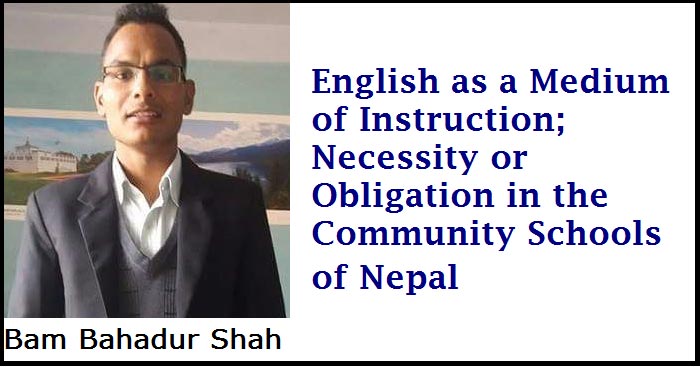
English as a Medium of Instruction; Necessity or Obligation in the Community Schools of Nepal
The English language has been taught and learned as a foreign language in the context of Nepal. The Prime Minister Jung Bahadur Rana started the English Education when he returned from the U.K. in 1854 A.D. The government of Nepal has started to teach English as a compulsory subject in grade one in the academic year of 2061 B.S. (Sharma, 2069) all together there are 35601 Schools in Nepal (Flash 2074 B.S.). There are two types of educational systems in Nepal.
The first one is community schools where all the responsibilities are taken by the government and the second is institutional schools in which all the responsibilities are taken by the particular person, shareholder or institutions. From the very beginning, the former has been using the Nepali language as a means of instructions whereas later ones have been using English as a means of instruction. Furthermore, the students who are representing community schools are somehow poor in English compare to private boarding school students.
The allocation of budget by the government in a community school is not satisfactory (10.68% budget 2076) and the quality of education is not picking up. The vision, mission, goal, and objectives of educational planning are not far-sighted instead they have been formulated as the demand and order of the different agencies and donors. This is the guardians and society who evaluate their children performance in the name of speaking English either insides of schools or outsides of schools which is beyond the logic and rationality of human being.
Almost all the teachers (98.2%) have been trained and qualified in Nepal according to the Ministry of Education Science and Technology, National Center for Educational Development (NCED) Report but the result is quite satisfactory .if we see the reality, there are few students at community schools of particular areas. Conversely, the number of students is increasing day by day in certain renounced boarding schools of urban areas. It doesn’t mean that community schools do not have students at all. Some of the private schools are running without having basic parameters, where direct supervision and monitoring is necessary from the part of stakeholders.
Particularly, some of the community schools in remote and Terai area, the numbers of teachers are more than students. Thus, the government has made a master plan to merge schools according to geographical distance, number of students, and teachers. (Darbandi Milan, 2073)
Similarly, the government has recently decided to run community schools in the English medium. Though the legal provision about the Medium of instruction in the schools is directly stated by the education act latest amendment (2028). The plan is really praiseworthy but it is seemed to decide in a hurry because of not well planning and sufficient infrastructures. I am not against this campaign but the intention of this article is to be well prepared beforehand. All the teachers are not equally qualified in English. Even they cannot speak in English but they are teaching in English in the classrooms. It means I am not blaming the teachers because they are from different subjects. They are teaching in the name of completing the courses but not facilitating to learn students. They are evaluating the students and learning instead of evaluating the students and learning. Here, the main culprits of the problem are an educational system, examination trend, evaluation and curriculum themselves.
The students are neither capable of Nepali nor in English because of this impractical and irrelevance decision of the government. Nowadays, this is the problem of not only students but also teachers at community schools. When the School Sector Reform Program (SSRP) midterm evaluation (2012) had identified the main problem of quality deficit in community schools is students are poor in reading skill. Hence, the National Early Grade Reading Program (NEGRP) has focused on the improvement of reading skill from grade 1-3 since 2014 AD. On the contrary, the government itself has started to teach in English. Teaching in English seems kind of formality and ways of attracting students at schools. Some of the community schools have really done better and they have a great challenge to manage the students. The result and performance of students are also best in the academic and non-academic arena.
Therefore, English as a Medium of Instruction is a Necessity or Obligation in the community schools of Nepal. If we have a clear plan and teachers are well-qualified, trained and well-equipped building, it would be necessity and call of the day but without well planning and management if we take English as a Medium of Instruction (EMI), it will be the obligation of the government to replace the private boarding schools. Finally, the concerned authority should be aware and responsible to make a far-sighted plan and bring a kind of radical change in the educational system of Nepal.
The central concerns and findings of the article are to inform about the importance of English as the medium of instruction. Find out the ground reality of the educational system of Nepal. (The community schools are most). Make aware of the guardians about the educational quality of community schools. Be familiar with the legal provision about the classroom instruction. Find out the condition of students about Nepali language learning. To make the community schools teachers more well-planned and courageous to cope with the problem.
Make the concerned authority more responsible and accountable. Furthermore, to make the teachers more qualified and dedicated about the different educational programs. To quest the thirst of researcher itself is the next virtue of this article. To make the government, policymaker, curriculum designer and textbook writer, parents, teachers and students more responsible about this matter of discussion.
(Author: Bam Bahadur Shah)
The author is an English Language Teacher at community school of Kathmandu District





